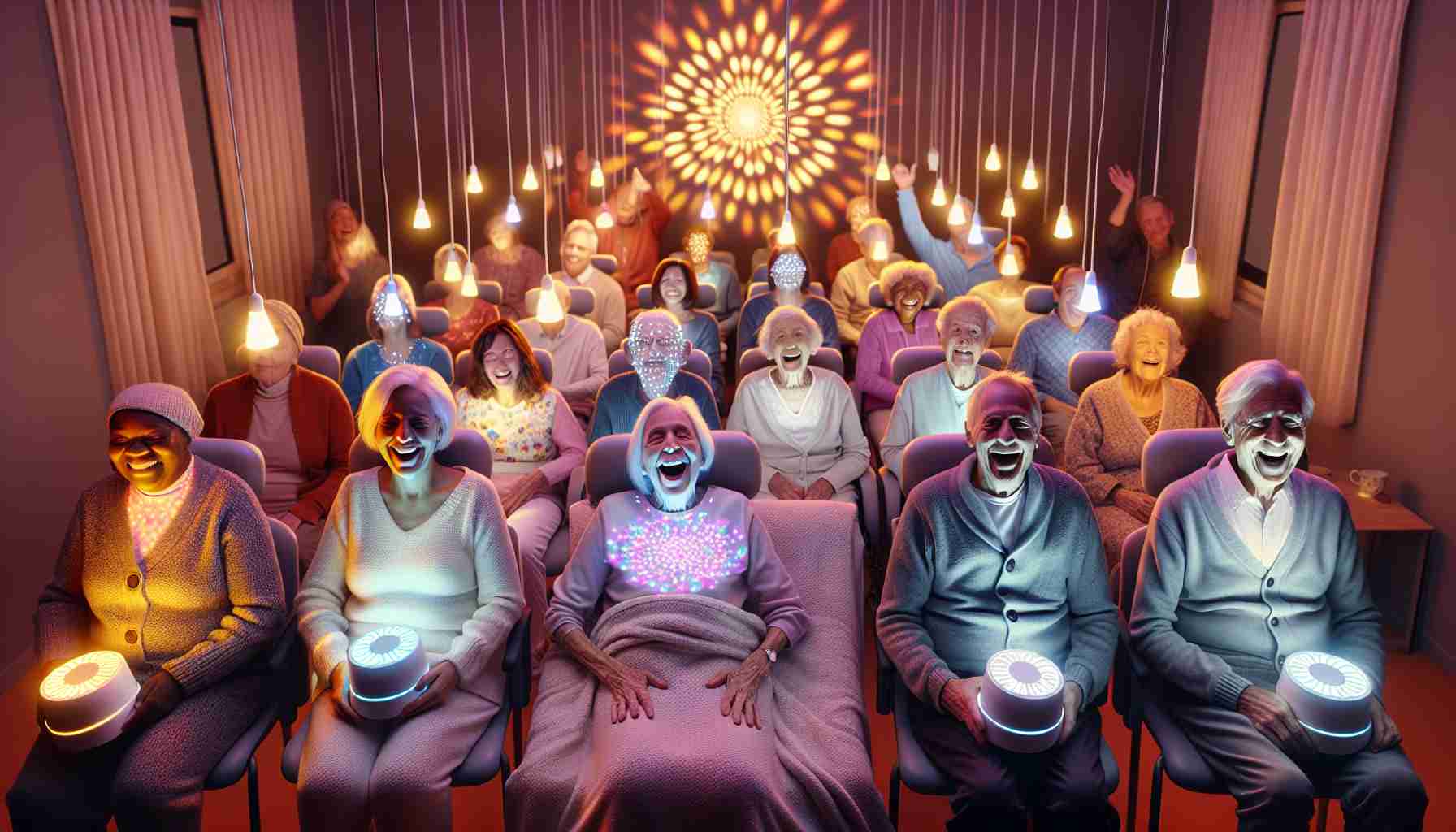A groundbreaking form of interactive light therapy is bringing newfound joy and engagement to dementia patients. Age UK has implemented the Happiness Programme in Sheffield, using games and virtual reality technology to improve mobility and communication for individuals living with dementia.
The programme, developed by Social-Ability, offers a variety of activities designed to stimulate participants. They can enjoy virtual experiences like train travel, motor racing, table tennis, quizzes, and even watch a sunset or stargaze. The projector used in the programme can project images onto people’s bodies or bedsheets, creating a multi-sensory experience.
John Ramsay, the managing director of Social-Ability, shares a personal connection to the cause. His father was diagnosed with dementia when Ramsay was just 12 years old. Launching the programme in 2020 holds deep meaning for him. He explains, “We want it to spark laughter and happiness and help do the things we take for granted.” Unlike virtual reality headsets, which may be cumbersome or disorienting for some dementia patients, the Happiness Programme brings the virtual experience into the natural world.
Held at the Hillsborough Wellbeing Centre, the dementia day services provided by Age UK Sheffield have seen significant improvement with the inclusion of the Happiness Programme. Elsie Ledger, the charity’s senior community projects lead, describes how the programme “really enhanced” their sessions. They have been able to bring Greece to the centre through sunrise projections, hot air balloon rides, and flag quizzes during Greek week. Not only do the participants benefit from this interactive therapy, but the staff also experiences joy and happiness while engaging with it.
The safety of the Happiness Programme is another major advantage. Ledger emphasizes the lack of risk involved, allowing individuals to enjoy activities like swimming and table tennis in a secure environment. While dementia may limit certain abilities, it should not inhibit the overall experience of joy in life.
Andrew Spears, the sales director of Social-Ability, highlights the overwhelmingly positive feedback they have received. Users report improved physical, social, and cognitive engagement. The games in the programme are designed with an anti-failure feature to foster a supportive environment. Spear adds that they are continuously working with their partners to expand the list of activities offered.
Beyond dementia, the Happiness Programme shows potential for assisting individuals with other cognitive challenges, such as autism. The profound impact it has on fostering connections and communication is evident, as family members have been moved to tears by the newfound interactions with their loved ones.
The interactive light therapy provided through the Happiness Programme is a testament to the power of technology in improving the lives of dementia patients and other vulnerable populations. As Age UK and Social-Ability continue to innovate and expand their offerings, the programme is set to reach even more isolated individuals and bring joy and engagement to their lives.
Additional facts:
1. The Happiness Programme was developed based on research that suggests light therapy can have a positive impact on individuals with dementia. Studies have shown that exposure to bright light can help regulate sleep patterns, reduce agitation, and improve cognitive function in dementia patients.
2. The use of virtual reality technology in the Happiness Programme allows participants to experience activities and environments that may be difficult or impossible for them to access in reality. This virtual experience can provide a sense of adventure and novelty, promoting engagement and stimulation.
3. The projector used in the programme is portable and can be easily set up in different locations, allowing for flexibility in delivering the therapy. This means that the Happiness Programme can be implemented in various settings, such as care homes, hospitals, or community centers.
4. The Happiness Programme is not solely focused on entertainment; it also aims to promote physical activity and social interaction. Through activities like table tennis or virtual motor racing, participants can engage in physical movement and connect with others, enhancing their overall well-being.
5. The impact of the Happiness Programme goes beyond the individual with dementia. Family members and caregivers often witness improved communication and emotional connections when engaging in the interactive therapy. This can provide a sense of relief and joy for loved ones.
Important questions and their answers:
1. How does interactive light therapy work?
Interactive light therapy involves using a special projector to project images or videos onto surfaces or individuals. The therapy aims to provide a multi-sensory experience and stimulate engagement and joy in individuals with dementia or other cognitive challenges.
2. Are there any potential risks associated with the Happiness Programme?
The Happiness Programme is designed to be safe and lacks physical risks. However, it is important to consider individual needs and preferences. Some participants may find certain activities or visual stimuli overwhelming, so it is crucial to tailor the therapy to each person’s comfort level.
3. Can the Happiness Programme be implemented at home or is it only available in specific centers?
The portable nature of the projector used in the Happiness Programme allows for flexibility in delivering the therapy. While it is currently implemented in specific centers like the Hillsborough Wellbeing Centre, there is potential for the programme to be adapted for home use with the right equipment and support.
Key challenges or controversies:
1. Cost and accessibility: The use of interactive light therapy may require investment in equipment and training. Cost could be a barrier to implementing the programme in all care settings or homes, limiting accessibility for some individuals with dementia.
2. Individual response and preferences: Not all individuals with dementia may respond positively to interactive light therapy. It is important to consider the preferences and needs of each person to ensure that the therapy is tailored to their individual requirements.
Advantages:
– Promotes engagement and joy in individuals with dementia.
– Enhances communication and social interaction.
– Offers a safe and secure environment for activities.
– Portable and flexible in its implementation.
– Potential for assisting individuals with other cognitive challenges.
Disadvantages:
– Cost implications for implementing the programme.
– Individual response and preferences need to be considered.
– Limitations in reaching all isolated individuals who could benefit from the therapy.
Suggested related link: Age UK



















